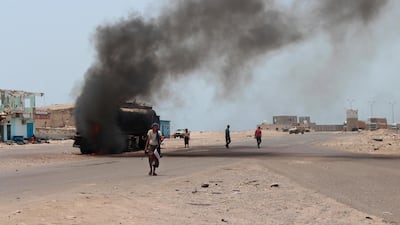At the mouth of Bab El Mandeb Strait, the southern port city of Aden is both strategically and politically important. It has served as the seat of Yemen’s government since it was liberated from Houthi rebels in 2015 and sits adjacent to some of the world’s most vital shipping lanes. Aden had also been cleared of militant groups seeking to over run the city.
In the past few weeks, Aden has witnessed in-fighting between forces loyal to the government and the Southern Transitional Council, backed by the Arab coalition. Once united in the battle against the Houthis, the split between factions is threatening to tip the city into chaos and open up a power vacuum. On Friday, the worst fears of those seeking to end the war in Yemen were realised when a suicide bomber killed three members of Yemen’s security forces, in an attack claimed by ISIS. In a separate attack, thought to have been mounted by Al Qaeda in the Arabian Peninsula (AQAP), the military chief of the Security Belt forces, narrowly escaped a roadside bomb that injured five of his guards.
The attacks came shortly after the Arab coalition launched a series of airstrikes targeting terrorist groups in Yemen. These extremists flourished briefly in the interlude of power in 2015 when the Houthis lost their grip on the city. They have been waiting in the wings for a chance to exploit Yemen’s fragile balance of power and re-establish control. That cannot be allowed to happen.
The coalition’s pre-emptive airstrikes came after intelligence that extremists were planning to target their ranks. They attacked coalition fighters at Aden’s airport and will no doubt be plotting to regroup and attack again.
At a critical time in the Yemen war, with the Stockholm agreement still waiting to be implemented, unity is needed among those fighting to re-establish peace and prosperity to the country. As the UAE’s Ministry of Foreign Affairs and International Co-operation said in a statement, terrorist cells have “started to accelerate their activity” and pose a “menacing threat to the strides made by the Arab coalition to uproot the scourge of terrorism in Yemen”. Efforts to bring about peace cannot be derailed by those who wish to take advantage of divisions among the ranks of fighters. Now is the time to come together to present a united front against that very scourge. The international community cannot be complacent when it comes to the threat of militant groups seeking to find a foothold in Aden.
Since clashes broke out, Saudi Arabia has offered to broker talks between all factions in Riyadh. As both the Saudi and UAE governments have said, dialogue is the only way to end the crisis. On a visit to Saudi Arabia on Wednesday, US Secretary of State Mike Pompeo also emphasised the importance of a negotiated resolution. There are concerns that Al Islah militants linked to the Muslim Brotherhood are influencing government forces. No extremist ideology should be allowed to flourish. All parties should make a concerted effort to stamp out terrorist activity and work together towards a more peaceful future.

